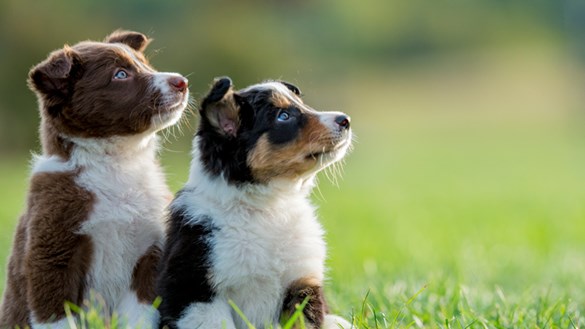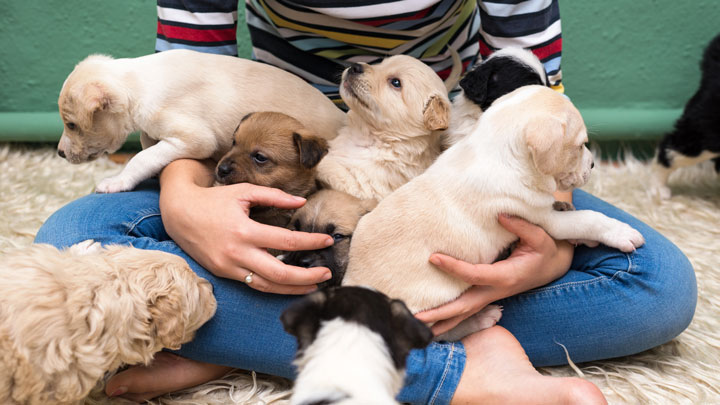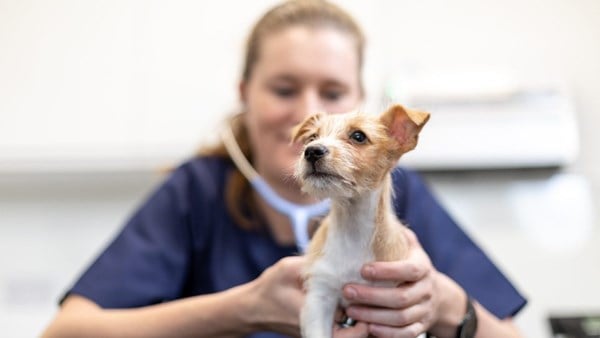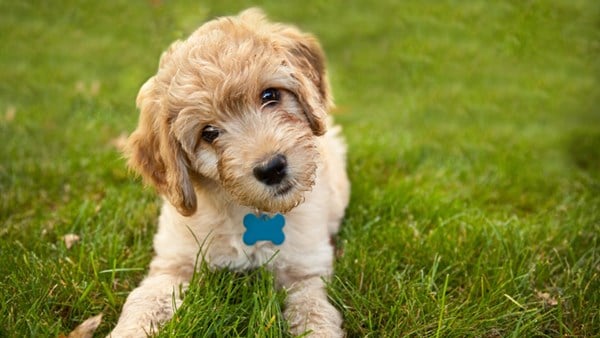The Importance Of Puppy Socialisation
There are many benefits to puppy socialisation; the window of opportunity is small, so it’s important to know what you need to do and when.

What does puppy socialisation actually mean?
Puppy socialisation can be split into two key areas:
- The people and animals that you want them to have a relationship with
- The environment that they will live in
Puppies are not born with social skills; they are in fact hardwired to be wary of new things. They will be taught early socialisation skills from their mother along with their siblings, but there is a lot of work that needs to be done with all puppies to ensure that they grow into well-behaved adult dogs.
What age should I start socialisation from?
There is a window of opportunity that lasts up until a puppy is 16 weeks of age. Most puppies are picked up from the breeder at eight weeks of age, they aren’t able to socialise freely until they’ve had their 2nd vaccination at 12 weeks of age. Find out more about vaccinations here.
This means that the actual window of opportunity for full socialisation is between 12 and 16 weeks of age, so just 4 weeks. There are many things that you can do at home in the period between 8 and 12 weeks.
In short, you need to start socialising your puppy as soon as you pick them up. This will allow you to build things up gradually and not overwhelm them. You could start with simple things like getting them used to being picked up.
We recommend that you share 2-3 new experiences per day with your puppy, as this will avoid sensory overload.
Up until 16 weeks of age, your puppy will be much more open to new situations. You can help them to understand what they shouldn’t be scared of. After 16 weeks of age, you shouldn’t stop introducing them to new situations, but it may take longer to get them used to things as they are not as open-minded at this point.
How important is puppy socialisation?
Puppy socialisation is one of the most important things that you can do for your puppy. It will help them to grow into a calm and loving companion that is comfortable in a myriad of situations. Their early experiences will become a key part of their personality.

What are the benefits of puppy socialisation?
There are many benefits of thorough puppy socialisation, a key one being that you will have a happy and confident pet. One that grows up to be a well-rounded adult dog that is comfortable and calm in many situations.
A well socialised puppy is likely to have fewer behavioural issues and is less likely to display signs of aggression in stressful or exciting situations.
It will make dog-walking a more enjoyable experience, coupled with good-training – a well socialised and obedient dog makes dog-walking even more of a pleasure. Please ensure you have had your puppy microchipped before you take them out.
What sort of ‘things’ should I socialise my puppy with?
The list here could be endless, think about all of the things that your puppy may encounter in everyday life. There are some really obvious ones; people, especially children who get very excited by a cute puppy, other dogs, your vet and the car.
As well as less obvious things like pushchairs, umbrellas, masks, the doorbell, traffic and other loud noises.
It can help to break things down into stages based on the age of your puppy.
8-9 weeks: Get them used to your immediate family, being picked up, gentle grooming, your other (vaccinated) pets, the doorbell, the hoover, parcels and other deliveries, the mop or floor cleaner, anybody who visits your house, noisy children’s toys, the dishwasher and washing machine.
10-11 weeks: Increase their exposure to the above and introduce other items that you might have around the home, such as an umbrella, roller skates, bikes, suitcases, a hairdryer. Things that you might not have easy access to, but that would be good are a pushchair, a wheelchair and a child’s scooter - you may need to wait until you are outside to cover these.
Car travel will be important and of course your vet. You could also start to get them used to their lead and/or harness indoors, ready for when they can leave the house. Call your local practice to see if they would be happy for your puppy to visit and meet the reception team, of course not putting them on the floor and holding them the whole time.
12-14 weeks: After their second vaccination, things get a little more exciting – it’s time to venture out into the big wide world. You could start in the garden, get them used to different surfaces, grass, decking and pavement. There will also be many new smells at this point.
Then it’s time to think about the pavements outside of your garden, walking on the lead, parks and fields, people approaching you and your puppy, other dogs coming over to introduce themselves, and again, excited children. When you're out and about, it’s good to try and cover as many different types of people; think workmen in high-vis jackets, delivery drivers, groups of people – as wide a range as you can manage.
It’s also a time when you can think about puppy training or puppy pre-school at your local Medivet.
A fundamental part of socialisation is teaching your puppy to ignore other dogs. This doesn’t mean that they don’t interact with other dogs, but they shouldn’t ambush every dog that comes their way.
Try this – as you see a dog approaching you in the distance, start to engage with your puppy; you need to do this before they get over-excited. By doing this, you will build an association that when they see a dog approaching, they need to check-in with you before engaging. You could reward them with a treat or if it’s a friendly dog, you could allow them to interact. If you are consistent with this approach it should pay dividends in the future.
15-16 weeks: At this point your puppy should have experienced most elements of your everyday life, and it will just be about increasing the frequency of their exposure to them. It is essential that all of the elements and steps above are introduced gradually and calmly and are not rushed.
Don’t forget that many noises that we take for granted can be very scary for little ears when they first hear them; hairdryers, loud music, emptying of the dishwasher, traffic, children playing, shouting, sirens from emergency vehicles. Many people find that it’s best to introduce some of these in the home, via the internet or the TV. This makes them less of a shock when they may be heard out in the street.
Should my puppy go to classes?
It can be very beneficial for puppies to attend classes such as Medivet Puppy Pre-School. These sessions are a great way for puppies to get used to other dogs and people and with the added advantage of them all being at a similar stage in their journey of discovery.
Puppy training is also a great way to meet other dogs and it will get your puppy on the right path in terms of being an obedient and calm pet. It can also teach them how to pay attention when there’s a lot going on around them, be warned this may take a bit of time.
Help with socialising your puppy
We have partnered with a team of puppy trainer behaviourists, who are able to offer online training and provide tips on socialisation that can help you stay on track with this important part of your puppy’s life. To enquire about the puppy training, please click here.
What else should I know?
- Stay calm – this is about teaching your puppy to stay calm when faced with something new and potentially scary – lead by example.
- Act normal – if your puppy looks worried, you should provide them with reassurance. It’s good to do this by getting down to their level. You could try distracting them, but always try and act normal as possible. Once they are relaxed and calm, you could reward them.
- Retreat – your puppy should always have an escape route. At first, situations may be too much or too noisy. Allow them to retreat if you think it’s necessary.
- Reward – treat your puppy when they get it right and stay calm or ignore something. You should never punish them for being scared, this will quickly become an issue.
- Patience – your puppy may need to encounter certain things a few times before they get it right.
- Have fun – the objective is to teach your puppy that the world is a fun place, the best way to do this is to have fun with them.
- Keep it up – it doesn’t need to stop at 16 weeks, there’ll be many things that your dog won’t experience before they’re 16 weeks.



